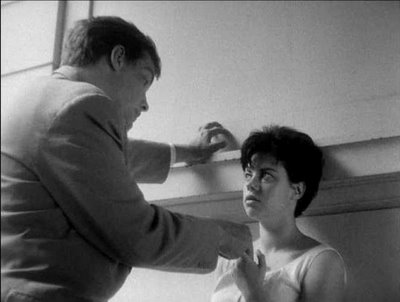In two days, I devoured the entire box -- features, interviews, books and extras; I had to, because of my deadline and other pressing duties. I suppose this was a bit like gulping down a particularly fine bottle of wine, over the tongue and into the belly, but the retrospective was no less intoxicating for it. These films were previously issued on DVD by Fox Lorber in scratchy, stale-looking presentations, so I'm happy to report that Criterion's new high-definition transfers of his establishing works (supervised by Rohmer himself) are exquisite. Have a look for yourself:
 THE BAKERY GIRL OF MONCEAU (1962) was shot in 16mm, and looks surprisingly crisp and sensual in this presentation.
THE BAKERY GIRL OF MONCEAU (1962) was shot in 16mm, and looks surprisingly crisp and sensual in this presentation. SUZANNE'S CAREER (1963): Also shot in 16mm, this film has the grainiest-looking transfer, but much of the film was shot in low-light interiors and it actually looks quite good, so all is forgiven.
SUZANNE'S CAREER (1963): Also shot in 16mm, this film has the grainiest-looking transfer, but much of the film was shot in low-light interiors and it actually looks quite good, so all is forgiven.
 MY NIGHT AT MAUD'S (1969): How many black-and-white DVD transfers have you viewed that can compare to savoring a rich dessert? This may be the most ravishing black-and-white DVD transfer I've ever experienced. In shots like these, of Françoise Fabian, you can actually sense how warm her skin is and can almost read her thoughts.
MY NIGHT AT MAUD'S (1969): How many black-and-white DVD transfers have you viewed that can compare to savoring a rich dessert? This may be the most ravishing black-and-white DVD transfer I've ever experienced. In shots like these, of Françoise Fabian, you can actually sense how warm her skin is and can almost read her thoughts.
 LA COLLECTIONEUSE (1967): This film was shot third but always intended as the series' fourth segment, as Rohmer wanted the stories split between three black-and-white and three color. Fox Lorber's DVD of this title was ugly trash. Criterion makes the colors and textures of leap off the screen with remarkable sharpness and clarity. Of all the films in the Rohmer set, this is the most surprising transfer and the most gorgeous of the color films. The young lady seen here, Haydée Politoff, later co-starred in Paul Naschy's COUNT DRACULA'S GREAT LOVE and can be seen reading a paperback of DRACULA in this movie.
LA COLLECTIONEUSE (1967): This film was shot third but always intended as the series' fourth segment, as Rohmer wanted the stories split between three black-and-white and three color. Fox Lorber's DVD of this title was ugly trash. Criterion makes the colors and textures of leap off the screen with remarkable sharpness and clarity. Of all the films in the Rohmer set, this is the most surprising transfer and the most gorgeous of the color films. The young lady seen here, Haydée Politoff, later co-starred in Paul Naschy's COUNT DRACULA'S GREAT LOVE and can be seen reading a paperback of DRACULA in this movie.
 CLAIRE'S KNEE (1970): This probably isn't the best frame for showing off the transfer's vibrant colors and amazing sense of depth, but I love this shot of Laurence de Monaghan, so that's what you get. A wonderful presentation of a delightful film.
CLAIRE'S KNEE (1970): This probably isn't the best frame for showing off the transfer's vibrant colors and amazing sense of depth, but I love this shot of Laurence de Monaghan, so that's what you get. A wonderful presentation of a delightful film.
 LOVE IN THE AFTERNOON (aka CHLOE IN THE AFTERNOON, 1972): The colors and textures in this film really pop, and when Zouzou strips down to her black chemise, for the first time on video, you can actually see through the sheer fabric. Based on my viewings of this film in 16mm and on Fox Lorber DVD, it was never a favorite of mine, but now I find it the second best of the Moral Tales, after MY NIGHT AT MAUD'S.
LOVE IN THE AFTERNOON (aka CHLOE IN THE AFTERNOON, 1972): The colors and textures in this film really pop, and when Zouzou strips down to her black chemise, for the first time on video, you can actually see through the sheer fabric. Based on my viewings of this film in 16mm and on Fox Lorber DVD, it was never a favorite of mine, but now I find it the second best of the Moral Tales, after MY NIGHT AT MAUD'S.
As you may have noticed, all six of the films are presented in the standard 1.33:1 ratio. In an accompanying interview, Rohmer explains why this is his favored ratio and the films included amount to a veritable celebration of the format. The last two films in the set, CLAIRE'S KNEE and LOVE IN THE AFTERNOON, were composed so they could also be projected at 1.66:1, if necessary. I zoomed both of them up on my widescreen set and, while the images became more enveloping as a result, they also felt incomplete. I quickly returned to the 1.33:1, and I think you will, too.
That's as much as I'm going to say for now. Criterion will be releasing ERIC ROHMER'S SIX MORAL TALES on August 15, and I'll be writing at greater length about the set in next month's issue of SIGHT & SOUND.
But, in closing, let me be the first to tell you this much: If you get the set, be sure to empty the box of all the discs and books, at least once, to look inside. You'll be glad you did.